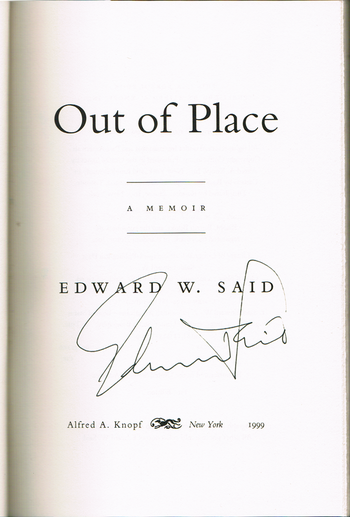Edward Said: Difference between revisions
imported>Christine Bush m (Changed name back to "Edward W. Said" with a ref re: the significance of doing so.) |
imported>Christine Bush (Changed sentence re: the publication of Orientalism viz-a-viz "postcolonial studies" to "Postcolonial Theory" and added source ref for this statement.) |
||
| Line 3: | Line 3: | ||
{{Image|EdwardSaid signature.png|right|350px|Signature of Edward Said on the title page of his 1999 memoir, "Out of Place."}} | {{Image|EdwardSaid signature.png|right|350px|Signature of Edward Said on the title page of his 1999 memoir, "Out of Place."}} | ||
'''Edward W.<ref>Said's middle initial is emblematic of the personal tensions he felt about his own cultural identification. His middle name is after his father, "Wadie," who also went by "William." Said almost always published under his name as "Edward W. Said" including that of his memoirs (shown right).</ref> Said''' (last name pronounced ''sah-eed'') was | '''Edward W.<ref>Said's middle initial is emblematic of the personal tensions he felt about his own cultural identification. His middle name is after his father, "Wadie," who also went by "William." Said almost always published under his name as "Edward W. Said" including that of his memoirs (shown right).</ref> Said''' (last name pronounced ''sah-eed'') was a Palestinian-American scholar most often noted as a critic of the Western academic school of [[Orientalism]]. Said authored the highly influential book entitled ''Orientalism''<ref>''Orientalism'' by Edward Said (1979) [http://www.worldcat.org/oclc/4831769 WorldCat]</ref> in 1979. The publication of this book is considered by many academics to have established the field of Postcolonial Theory<ref>[http://youtu.be/fVC8EYd_Z_g?list=PLvXyXhPkuQpx7ICYeZZDleXc85pnpkth4 Edward Said on ORIENTALISM] video introduced by Prof. Sut Jhally (Univ. of Mass. (Amherst).</ref>. Said was born in Jerusalem and was Christian. Said was educated in British schools in Egypt where his family lived prior to World War II. He later attended American prep schools and attended both Princeton and Harvard. He spent his entire academic career at [[Columbia University]] in New York City and was called by The New York Times "the most prominent advocate in the United States of the cause of Palestinian independence."<ref>''Edward W. Said, Polymath Scholar, Dies at 67'' [http://www.nytimes.com/2003/09/26/obituaries/26SAID.html NYTimes.com Archives]</ref> He died on Wednesday, September 24, 2003 at the age of 67. | ||
<references/> | <references/> | ||
Revision as of 15:17, 15 July 2014
Edward W.[1] Said (last name pronounced sah-eed) was a Palestinian-American scholar most often noted as a critic of the Western academic school of Orientalism. Said authored the highly influential book entitled Orientalism[2] in 1979. The publication of this book is considered by many academics to have established the field of Postcolonial Theory[3]. Said was born in Jerusalem and was Christian. Said was educated in British schools in Egypt where his family lived prior to World War II. He later attended American prep schools and attended both Princeton and Harvard. He spent his entire academic career at Columbia University in New York City and was called by The New York Times "the most prominent advocate in the United States of the cause of Palestinian independence."[4] He died on Wednesday, September 24, 2003 at the age of 67.
- ↑ Said's middle initial is emblematic of the personal tensions he felt about his own cultural identification. His middle name is after his father, "Wadie," who also went by "William." Said almost always published under his name as "Edward W. Said" including that of his memoirs (shown right).
- ↑ Orientalism by Edward Said (1979) WorldCat
- ↑ Edward Said on ORIENTALISM video introduced by Prof. Sut Jhally (Univ. of Mass. (Amherst).
- ↑ Edward W. Said, Polymath Scholar, Dies at 67 NYTimes.com Archives
